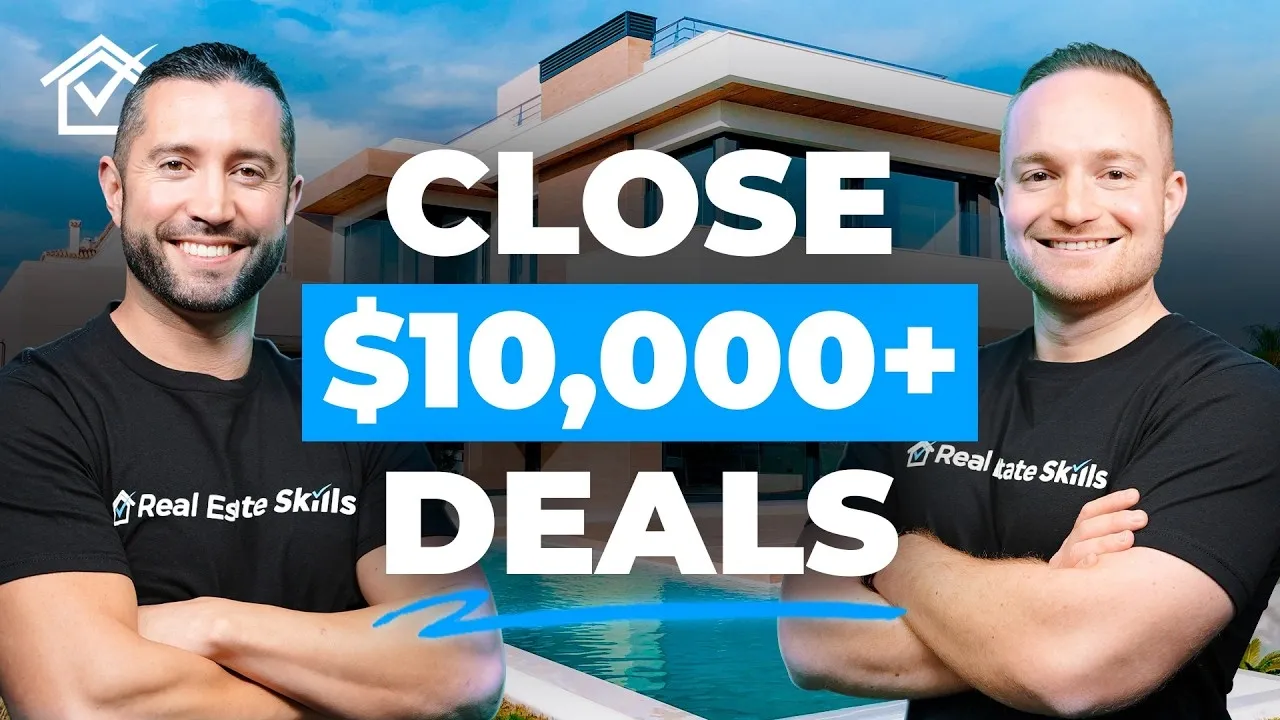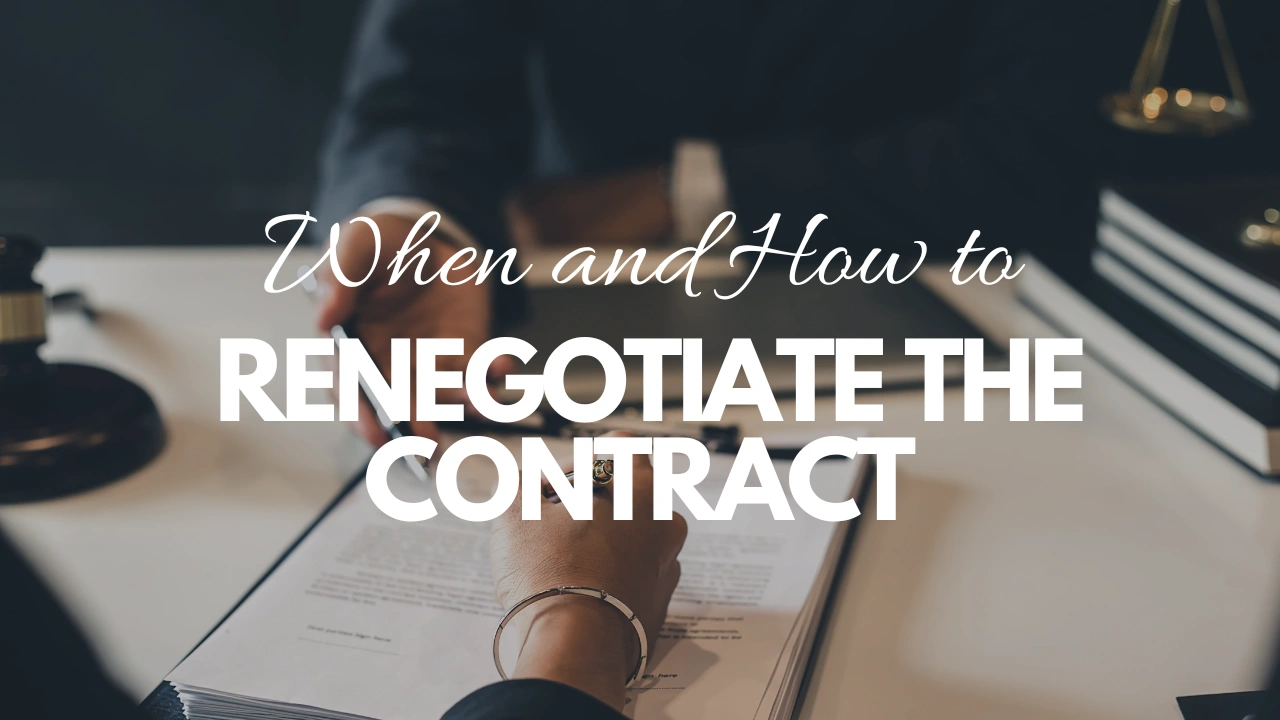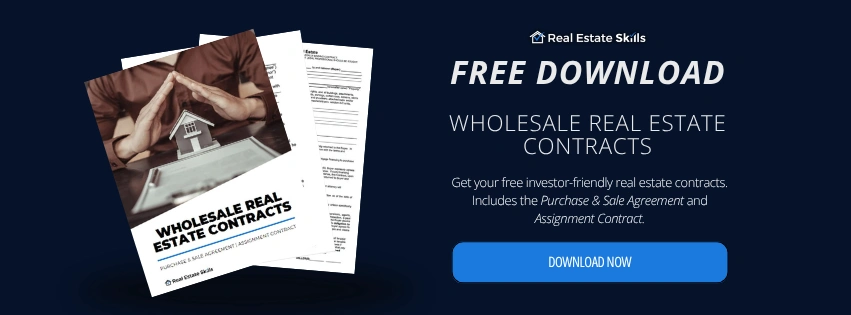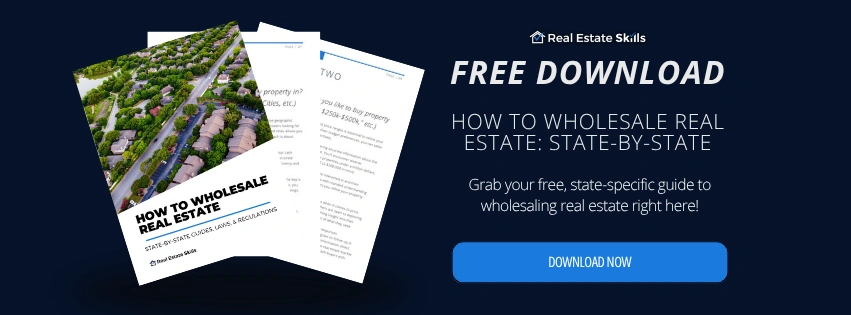How To Close Virtual Wholesale Real Estate Deals! ($10,000+)
Jul 11, 2025
It's crucial to structure your wholesale real estate contract favorably. This gives you time to find your cash buyer, shop the deal around, and protect your earnest money deposit.
Ultimately, it's about knowing how to close virtual wholesale real estate deals.
In this blog, you'll learn about:
- Importance of Inspection Contingency
- When and How to Renegotiate the Contract
- Closing Wholesale Deals With Real Estate Agents
- Starting the Selling Process to the Cash Buyer
- Virtual Wholesale Closing Methods
- Getting Paid For Virtual Wholesale Deals
- Scaling from Wholesaling to Passive Income
- Building a Scalable Virtual Wholesaling Business
- Wholesaling as a Path to Financial Freedom
If you’re serious about doing your first real estate deal, don’t waste time guessing what works. Our FREE Training walks you through how to consistently find deals, flip houses, and build passive income—without expensive marketing or trial and error.
This FREE Training gives you the same system our students use to start fast and scale smart. Watch it today—so you can stop wondering and start closing.
Want to learn how to consistently wholesale, flip houses, and invest in rental properties? Watch our FREE training now at Real Estate Skills!
Importance of Inspection Contingency
One of the most important elements in your wholesale contract is the inspection contingency. This allows you a set timeframe to inspect the property and decide if you're satisfied with its condition. If you're not, you can terminate the agreement and get your earnest money back.
This contingency is also your opportunity to shop the deal to cash buyers. Instead of conducting the inspection yourself, coordinate with your buyers or their team to handle it.
Ensure this is completed during your inspection period so you can secure a buyer before removing the contingency. Once removed, your earnest money becomes non-refundable.
Cash buyers might uncover unexpected repair needs during their inspections.
In those cases, you can either renegotiate the price or terminate the contract. This contingency provides you with the flexibility to ensure a profitable and low-risk exit.

When and How to Renegotiate the Contract
Sometimes, due to a lack of information or poor property listings, you discover issues after signing.
This is where the inspection contingency and proper backout clauses come into play. If something comes up, you can renegotiate.
It's essential to renegotiate only when justified, such as in cases of unexpected repair costs.
Doing so helps maintain good relationships with real estate agents and prevents burning bridges. This builds trust, increasing the likelihood that agents will bring you more deals.
Closing Wholesale Deals With Real Estate Agents
Always put your best foot forward and renegotiate only when necessary. This helps maintain strong relationships with agents who prefer working with trustworthy investors.
Most contracts today are signed digitally using tools like DocuSign or ZipForms, making virtual wholesaling possible without the need for in-person meetings.
Real estate remains a low-tech industry, and keeping your business lean using tools like Google Suite and e-signature platforms is key to success.
Read Also: Wholesaling Real Estate Step-by-Step PDF [FREE DOWNLOAD]
Starting the Selling Process to the Cash Buyer
After securing the contract, the next step is presenting the deal to your cash buyers. Since they’ve already been identified, it's just a matter of getting them to the property and moving toward closing. Once they're committed, it's time to move forward with finalizing the deal.
Virtual Wholesale Closing Methods
There are three main ways to close a virtual wholesale deal, all of which can be achieved without a physical presence. The most common and cost-effective method is the assignment of a contract.
1. Assignment of Contract Explained
An assignment of contract is an addendum to your purchase agreement that transfers your interest in the purchase to the cash buyer.
It includes an assignment fee that has been negotiated between you and the buyer. Once signed, the title company processes everything, protecting all parties involved.
2. Double Closing Explained
Double closing involves two separate transactions: one between the seller and wholesaler, and another between the wholesaler and buyer.
This approach allows you to temporarily take ownership of the property.
It's more complex, involving two purchase agreements, strategic timing, and careful handling of deposits.
However, it can be done without your own funds by using the buyer’s money or transactional lending.
Why Choose Double Closing Over Assignment
Double closing hides your assignment fee from the end buyer, especially useful when it's a large fee. It can also be required by hedge funds or when working with sensitive sellers.
Additionally, it helps new wholesalers establish a track record, which is useful for obtaining hard money or private funding for future deals.
3. Entity Assignment Method Explained
This advanced method involves putting a property under contract through an LLC, then selling the LLC itself to the buyer.
This avoids directly assigning the contract and keeps the buyer's name unchanged.
Some deals, especially bank-owned or REO properties, don’t allow assignments. Selling your LLC offers a workaround.
Why Use Entity Assignment (Legal and Strategic Reasons)
Concerns about debt within the entity can be addressed through affidavits or by forming a special purpose entity (SPE) for the transaction. This offers legal protection and transparency.
Entity assignments are also useful in states with wholesaling restrictions.
You’re not advertising a property or contract; you’re selling an LLC whose asset is a contract.
4. Using a Special Purpose Entity (SPE)
Creating an SPE is a way to structure your deals legally and cleanly.
You can assign the contract to this new entity and then sell it to your buyer.
It’s an effective workaround in markets with regulatory challenges.
While used less often, this method is valuable for sticky or high-stakes deals.
Getting Paid For Virtual Wholesale Deals
Once the deal closes, you get paid. This can happen via check, wire transfer, or mailed payment. Many investors prefer wire transfers, but mailed checks are still an option.
At this point, you’ve completed the full cycle—from contract to payment—and you’re ready to repeat the process.
Scaling from Wholesaling to Passive Income
As you grow, virtual wholesaling can help build capital and experience. You can then venture into virtual fix-and-flips or long-distance buy-and-hold strategies.
This transition converts active income into passive income, supporting your financial goals and covering expenses with rental income.
Read Also: Wholesaling Real Estate For Beginners: 8 Must-Do’s & Don'ts
Building a Scalable Virtual Wholesaling Business
Technology enables remote operations and scalable solutions. We've seen students close deals in markets they’ve never visited.
As your business grows, you can hire acquisition managers and delegate processes. This elevates you from day-to-day operations to true business ownership.
Wholesaling as a Path to Financial Freedom
Mastering the fundamentals of wholesaling leads to scalable success. Real estate has changed lives, ours included.
It's not just about profits but about creating freedom, flexibility, and a lifestyle aligned with your goals.
Whether you're 18 or 80, with the right systems and mindset, virtual wholesaling can help you achieve financial independence.
We're here to support you at Real Estate Skills, and we believe anyone can do this with the right tools and education.
If you’re serious about doing your first real estate deal, don’t waste time guessing what works. Our FREE Training walks you through how to consistently find deals, flip houses, and build passive income—without expensive marketing or trial and error.
This FREE Training gives you the same system our students use to start fast and scale smart. Watch it today—so you can stop wondering and start closing.
*Disclosure: Real Estate Skills is not a law firm, and the information contained here does not constitute legal advice. You should consult with an attorney before making any legal conclusions. The information presented here is educational in nature. All investments involve risks, and the past performance of an investment, industry, sector, and/or market does not guarantee future returns or results. Investors are responsible for any investment decision they make. Such decisions should be based on an evaluation of their financial situation, investment objectives, risk tolerance, and liquidity needs.







